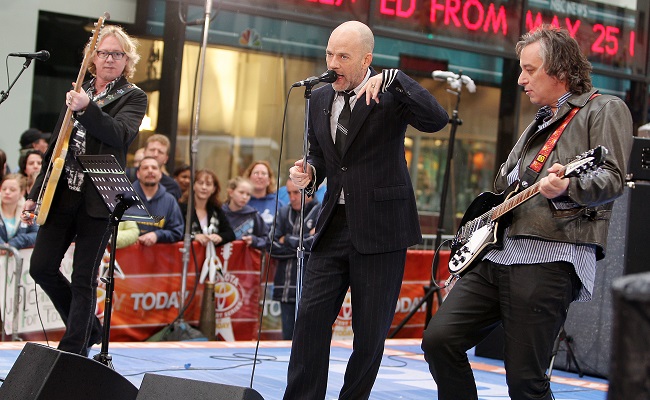
When R.E.M. called it quits in 2011, it was hard to deny that they were ending things on a high note. Their final two albums, that year’s Collapse into Now and 2008’s Accelerate, had been rightfully praised. Even if they felt a tad similar to what the band had already done, they were definitely a vast improvement over the mistakes the band had made before them. Or, that’s what the narrative says, anyway.
But when we consider R.E.M.’s legacy, are we excessively harsh on the three albums they made as a trio (before adding former Ministry drummer Bill Rieflin into the mix for the last two)? Let’s re-examine the three black sheep of the R.E.M. discography and see if we can’t find something to admire among the perhaps unfairly maligned.
In 1996, R.E.M. released New Adventures in Hi-Fi, their final album with original drummer Bill Berry. The album was vastly underrated at the time, but over the past two decades, it has morphed into its proper acclaim, which is befitting of an experimental release that rewards repeat listens. Unfortunately, shortly after the album’s release, Berry suffered an aneurysm, and decided not to return to R.E.M. At this point, the band faced a difficult decision: where most bands would have found a replacement drummer, R.E.M. continued on as a trio, with a drum machine essentially doing Berry’s job. Naturally, this altered the band’s sound considerably, as they embraced a far more mellow, at times electronic vibe, unlike anything they had done in the past. Understandably, the band’s longtime fans struggled to embrace this new approach.
The band’s first album as a trio was 1998’s Up, and it is easily the best work they did during this period. Honestly, now that New Adventures is getting the respect it so deserves, Up has probably taken its place as R.E.M.’s most underappreciated album. Fans and critics were lukewarm to the album’s drum-machine heavy sound, but over time, the album’s immense beauty reveals itself.
“At My Most Beautiful” is a stunning tribute to the Beach Boys that recalls Brian Wilson’s most sublime compositions, while “Daysleeper” paints an elegant portrait of a sad man just trying to get some damn sleep. One of Up’s most rewarding deep cuts, “Walk Unafraid” had its day in the sun last year, when it was covered by the duo First Aid Kit as part of the Wild soundtrack. The album still gets far less than the respect it deserves, but at least one of its best songs was introduced to an audience who might not otherwise think twice about R.E.M.
The follow-up, 2001’s Reveal, is a bit more rough around the edges than its predecessor, but it has some brilliant moments nonetheless. One in particular is its opening track, “The Lifting,” which lives up to its title by seemingly bringing listeners into the clouds as part of a dreamy airplane flight.
Equally worthwhile is “Imitation of Life,” the lead single which somehow failed to become a hit, and “I’ll Take the Rain,” a lament worthy of Automatic for the People. The album at times lags in places, and it’s not the most immediately exciting listen in the R.E.M. catalog, but its best moments will stick with you for years.
This brings us to the most maligned album of R.E.M.’s career, Around the Sun. I’ll be the first to admit, this is not my favorite R.E.M. album, and it very well could be the worst thing they ever did, but rather than simply dismissing it, we should at least consider why this album failed.
In its defense, the songwriting was strong in several places, but it was the drab production and sluggish execution that gave the album its negative reputation. “Leaving New York” is so close to being a classic R.E.M. song that it’s almost brutal to listen to it fail to reach its potential. The same goes for “Aftermath,” which could have been a great anthem if anyone involved were interested in turning it into one. The chorus of “now you see it all/ and you’ve worked it out” could have been enthralling in an alternate universe, but everyone involved just seems so bored, and that lethargy can’t help but engulf the listener, as well.
Ultimately, Around the Sun may have fairly earned its reputation, which is a shame, because if it had been approached with anything remotely approaching enthusiasm, it could have been the career-solidifying comeback that Accelerate would prove to be four years later.
But while that album is the black sheep in the R.E.M. canon, the band’s work during their time as a trio is far more complex — and far better — than many people give it credit for. Up is a minor triumph, Reveal is inconsistent, but rewarding, and even the lackluster Around the Sun is not wholly devoid of worthwhile moments (witness the ’60s pastiche of “Wanderlust”). Was this the proudest era of R.E.M.’s career? Probably not. But it wasn’t the utter waste it is often painted to be. As we consider the band’s legacy, the great songs the band produced during this period are absolutely worth remembering.






